一般疑问句、选择疑问句的详细用法备课讲稿
疑问句(一般疑问句、特殊疑问句)公开课教学课件
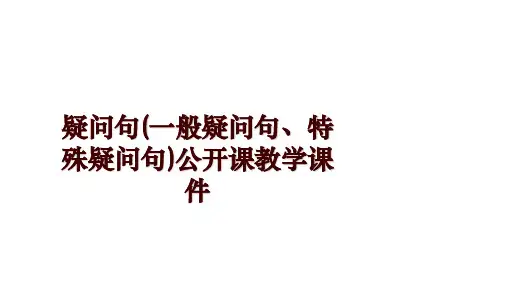
Try to complete the dialogue
• Millie: _W_h_e_n __are we going to Harbin?
• Mum: On 10th February. • Millie: _W_h_at___ is the weather like in Harbin at
➢ what----Activity or thing (对行为和事物提问)。
e.g . 1. “What are you talking about?” “你们在谈什么?” “We are talking about our family.” “我们在谈论我们 的家庭情况。”
2. “What is your name?” “你叫什么名字?” “My name is Wang Li.” “我叫王丽。”
How old is she?
3. Jim plays with his dog for about two hours on Sunday.
How long does Jim play with his dog on Sunday?
4. Millie goes to the Reading Club twice a week.
No, she is not./No, she isn`t. 2.Can you see a star?
Yes, I can.
No, I can not./No, I can`t.
3. Do you like English.
Yes, I do. No, I do not./No, I don`t.
Why are you going to buy moon cakes?
C Using ‘some’/ ‘any’
小学英语语法一般疑问句说课稿
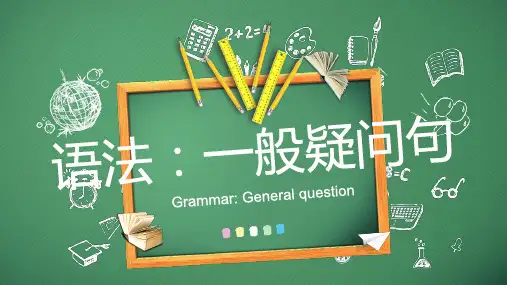
My father often helps my mother do housework.
回答:
Does your father often help your mother do housework?
结构:助动词Do+主语+动词原形(+其他)?
回答:肯定Yes, 人称代词+do/does / 否定No,人称代词+don’t/doesn’t.
重难点
Key and difficult points
重点Key points 1. 掌握一般疑问句中提问语调的升降 2. 将陈述句改为一般疑问句的用法 3. 区分一般疑问句中用be动词、助动词和情态动词的用法 4. 掌握一般疑问句的回答标准
Difficult points 难点 1. 区分一般疑问句中用be动词,助动词和情态动词对应不同人称的用法
句型转换 考查对陈述句转换为一 般疑问句的运用
选择题 考查学生对Be动词助 动词情态动词的区分, 不同人称动词的变化形 式,以及后面所接动词 形式
问答题 考查一般疑问句的回答 标准的运用
四、总结归纳
Summary
概念
结构
动词变化
回答标准
板书
结构:Be动词+主语+其他?
回答:肯定Yes, 人称代词+be动词 / 否定No,人称代词+be not.
2. 梳理结构---情态动词
You can answer the question. Can you answer the question?
She can play the piano.
回答:
教学方法Teaching method
根据所任教班级的具体情况,在本堂课中以任务型教学作为 课堂教学设计理念,具体采用问答法,交际教学法,在教学中 突出实际性,注重听说的实用性,同时适时进行情感和策略调 整,以形成积极的学习态度,促进语言实际运用能力的提高。 坚持师为主导,学生为主体,任务为基础教学原则。
一般,选择,特殊疑问句(课堂PPT)
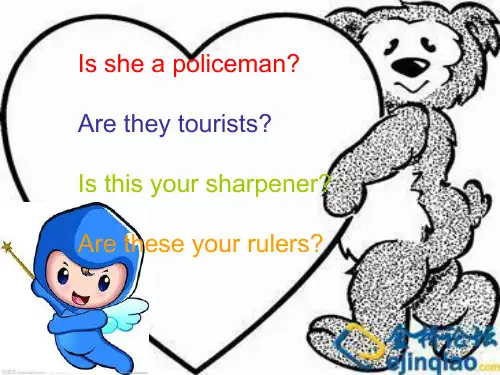
a student?
she
It
a monkey?
Are they
students?
指示代词 Is this my pen?
Are these my watches?
.
3
Is he a student? Yes, he is. No, he isn’t.
Are you students? Yes, we are. No, we aren’t.
Is she a policeman? Are they tourists? Is this your sharpener? Are these your rulers?
.
1
一般疑问句 定义:一般疑问句用于询问某事物或情况是否
属实,句末用升调;通常需要对方做出 肯定或否定回答,答句中一般有yes或no。
.
7
3.在朗读一般疑问句时,要用升调。其答语用 降调。
Is it a grey suit?
Yes, it is.
.
8
Let’s make sentences
.
9
He is not a customs officer. His uncle and aunt are not at home. I am not in the jeep.
.
14
Look and practice
1.pencil-box, your, is, this This is your pencil-box. Is this your pencil-box?
2.student, you, are, a You are a student. Are you a student?
一般疑问句 教案
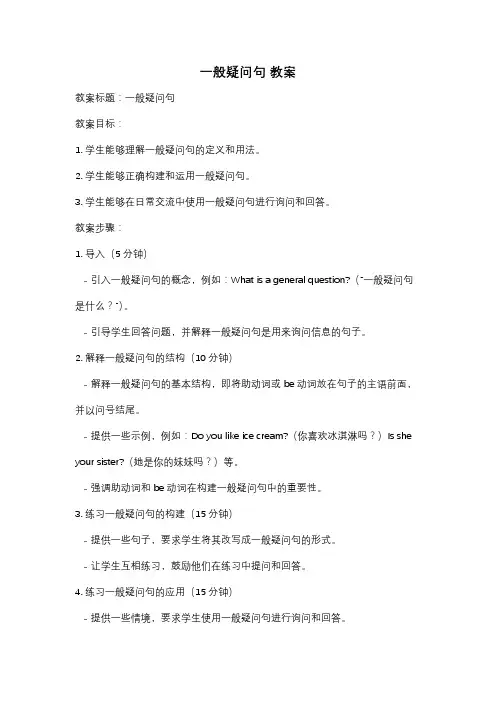
一般疑问句教案教案标题:一般疑问句教案目标:1. 学生能够理解一般疑问句的定义和用法。
2. 学生能够正确构建和运用一般疑问句。
3. 学生能够在日常交流中使用一般疑问句进行询问和回答。
教案步骤:1. 导入(5分钟)- 引入一般疑问句的概念,例如:What is a general question?(“一般疑问句是什么?”)。
- 引导学生回答问题,并解释一般疑问句是用来询问信息的句子。
2. 解释一般疑问句的结构(10分钟)- 解释一般疑问句的基本结构,即将助动词或be动词放在句子的主语前面,并以问号结尾。
- 提供一些示例,例如:Do you like ice cream?(你喜欢冰淇淋吗?)Is she your sister?(她是你的妹妹吗?)等。
- 强调助动词和be动词在构建一般疑问句中的重要性。
3. 练习一般疑问句的构建(15分钟)- 提供一些句子,要求学生将其改写成一般疑问句的形式。
- 让学生互相练习,鼓励他们在练习中提问和回答。
4. 练习一般疑问句的应用(15分钟)- 提供一些情境,要求学生使用一般疑问句进行询问和回答。
- 情境可以包括日常生活、学校、家庭等方面的话题,例如:询问对方的兴趣爱好、询问是否完成作业等。
5. 总结与评估(10分钟)- 复习一般疑问句的定义和结构。
- 提问学生关于一般疑问句的问题,确保他们对所学内容有所掌握。
- 给学生一些练习题,以评估他们对一般疑问句的理解和应用能力。
6. 拓展活动(5分钟)- 鼓励学生在日常交流中积极运用一般疑问句。
- 提供一些额外的练习题或活动,以帮助学生巩固所学内容。
教学资源:- PowerPoint演示文稿- 一般疑问句练习题- 板书和白板标记工具教学扩展:1. 引导学生学习其他类型的疑问句,如特殊疑问句和选择疑问句。
2. 给学生提供更多的练习机会,以提高他们的一般疑问句的运用能力。
3. 鼓励学生在写作和口语表达中使用一般疑问句,以增强他们的语言表达能力。
一般疑问句教案
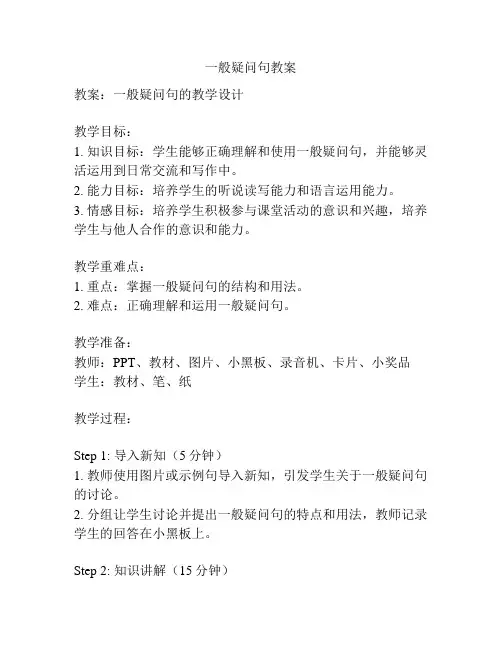
一般疑问句教案教案:一般疑问句的教学设计教学目标:1. 知识目标:学生能够正确理解和使用一般疑问句,并能够灵活运用到日常交流和写作中。
2. 能力目标:培养学生的听说读写能力和语言运用能力。
3. 情感目标:培养学生积极参与课堂活动的意识和兴趣,培养学生与他人合作的意识和能力。
教学重难点:1. 重点:掌握一般疑问句的结构和用法。
2. 难点:正确理解和运用一般疑问句。
教学准备:教师:PPT、教材、图片、小黑板、录音机、卡片、小奖品学生:教材、笔、纸教学过程:Step 1: 导入新知(5分钟)1. 教师使用图片或示例句导入新知,引发学生关于一般疑问句的讨论。
2. 分组让学生讨论并提出一般疑问句的特点和用法,教师记录学生的回答在小黑板上。
Step 2: 知识讲解(15分钟)1. 教师使用PPT向学生讲解一般疑问句的结构:陈述句基本结构 + 助动词/系动词/情态动词 + 主语 + 其他?例如:Is he a student? Do you like sports?2. 教师讲解一般疑问句的用法:用于询问对方的意见、情况、状况等。
例如:Do you want to go shopping? Is she your sister?3. 教师通过示例句和图片向学生展示一般疑问句的实际应用场景,让学生更好地理解其用法。
Step 3: 操练训练(30分钟)1. 教师播放录音,让学生听录音并回答问题。
例如:Is she playing tennis? Do they like swimming?2. 教师出示卡片,上面写有一般疑问句,让学生读出句子,并回答问题。
3. 教师给学生一些情景,让学生编写一般疑问句,然后进行对话练习。
例如:S1: You are a teacher.S2: Am I a teacher?S1: No, you aren't.4. 教师给学生分组,让学生在小组内编写一些一般疑问句并进行对话练习,然后选出最有创意的对话进行展示。
一般疑问句教案
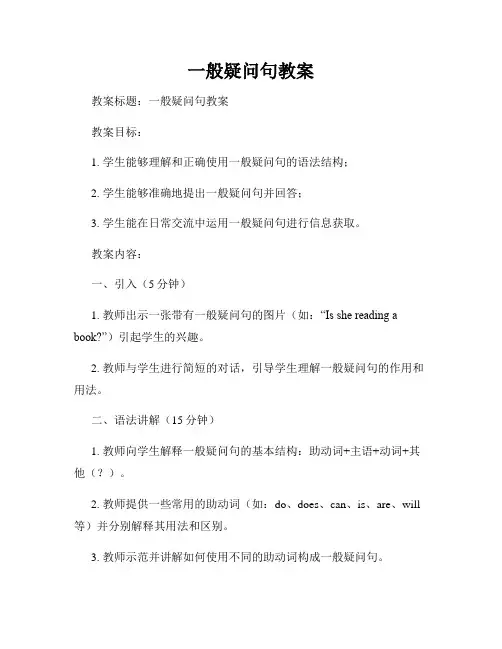
一般疑问句教案教案标题:一般疑问句教案教案目标:1. 学生能够理解和正确使用一般疑问句的语法结构;2. 学生能够准确地提出一般疑问句并回答;3. 学生能在日常交流中运用一般疑问句进行信息获取。
教案内容:一、引入(5分钟)1. 教师出示一张带有一般疑问句的图片(如:“Is she reading a book?”)引起学生的兴趣。
2. 教师与学生进行简短的对话,引导学生理解一般疑问句的作用和用法。
二、语法讲解(15分钟)1. 教师向学生解释一般疑问句的基本结构:助动词+主语+动词+其他(?)。
2. 教师提供一些常用的助动词(如:do、does、can、is、are、will 等)并分别解释其用法和区别。
3. 教师示范并讲解如何使用不同的助动词构成一般疑问句。
三、示范与练习(20分钟)1. 教师示范如何用一般疑问句询问他人的名字、个人信息等,并鼓励学生参与对话。
2. 学生们与搭档一起练习提出和回答一般疑问句,可以选择日常生活中的情景进行模拟对话。
3. 教师提供一些练习题或任务,要求学生独立完成并在全班分享答案。
四、拓展延伸(10分钟)1. 教师为学生提供更多的语言输入资源,如视频片段、漫画、歌曲等,以帮助学生进一步理解和巩固一般疑问句的用法。
2. 学生分组合作,创作并表演一段对话或小剧场,其中要求使用一般疑问句进行交流。
五、总结与反思(5分钟)1. 教师与学生一起总结一般疑问句的关键要点和常用表达方式。
2. 学生回答教师提出的问题,以检验他们对一般疑问句的掌握程度。
3. 学生们表达他们在学习过程中的感想和困难,并共同探讨解决办法。
教案扩展:1. 学生互相编写问答对话,在小组中互相提问,以加强对一般疑问句的理解和使用能力。
2. 学生根据教师给出的情境,编写一段对话并使用一般疑问句进行表演。
3. 学生自主查找并分析其他语法结构的疑问句,与一般疑问句进行对比学习。
教案评估:1. 课堂练习:学生能够正确地提出和回答一般疑问句。
选择疑问句使用语法教案
课程名称:选择疑问句教学内容:一. 选择疑问句的两种形式结构(一般疑问句形式/特殊疑问句形式)二.选择疑问句的回答三.选择疑问句与其他句型的转换教学对象:七年级下预科学生教学目标:学生能够正确理解选择疑问句的结构,并能正确进行回答及与其他句型进行转换教学重难点:对选择疑问句的句子结构的理解及灵活运用Teaching StepsStep 1: Leading-in and Warming-upWhat color do you like?Red? Green?Step 2: Teaching and Drills知识卡片1选择疑问句含义选择疑问句是指提供两种或多种情况供对方选择的疑问句。
其表现形式可以是一般疑问句形式,也可以是特殊疑问句形式,选项之间要用连词or连接。
例题1.Are you a doctor _____ a teacher?A.andB. norC. orD. so2.Does he like this _____ that?A.andB. norC. orD. so3.Do you want to go there by land _____ by air?A.andB. norC. orD. so4.My favorite color is green.(用yellow 改为选择疑问句)Are your favorite color green________yellow?知识卡片2选择疑问句的一般疑问句形式一般疑问句形式的选择疑问句由“一般疑问句+or+选择部分”组成例如:Is that coffee yours or hers? 这咖啡是你的还是她的?Are you going by train or by plane? 你坐火车去还是坐飞机去?注意:有时选择部分用or not 表示例如:Are you ready or not? 你准备好没有?Do you like the film or not? 你喜不喜欢这部电影?知识卡片3选择疑问句的特殊疑问句形式特殊疑问句形式的选择疑问句由“特殊疑问句,选项A+or+选项B”组成例如:Which would you like, tea or coffee? 你想要哪样,是茶还是咖啡? Who runs faster, you or Tom? 你和汤姆谁跑得快一点?小试牛刀判断下列句子是否是选择疑问句1.Are they your friends?2.Is it right or wrong?3.Does he go to school on foot?4.Are you coming or not?5.Are you tired?6.How many pens do you have ,one or two?7.Do you want to buy it or not?知识卡片4选择疑问句在回答时不能回答yes或no,必须选择选项进行回答。
一般疑问句、选择疑问句的详细用法
一般疑问句、(一)一般疑问句1、一般疑问句概述一般疑问句(general questions),也可称为“yes/no”questions(是否型问句),因为它一般是由yes或no回答的,如:—Can you swim to the other side 你能游到对岸吗—Yes, I can.是的,我能。
—No,I can’t.不,我不能。
—Have you locked the door 你锁门了吗—Yes,I have.是的,锁了。
—No,I haven’t. 不,没有锁。
2一般疑问句的结构(1)基本的结构为:be/助动词/情态动词+主语+谓语/表语+(其他),句子要读升调,如:Are they your friends 他们是你的朋友吗Does he go to school on foot 他是步行去上学吗Will you be free tonight你今晚有空吗Can you play basketball你会打篮球吗(2)陈述句亦可用作一般疑问句,多用在非正式文体中,句末有问号,用升调,如:Somebody is with you 有人和你一起吗He didn’t finish the work 他没有做完活吗You are fresh from America,I suppose 我猜,你刚从美国回来吧3、一般疑问句的答语(1)一般疑问句一般由yes或no来回答,如:—Are you tired你累了吗—Yes,I am.是的,累了。
—No, I’m not.不,不累。
—Does she do the cleaning她扫除了吗—Yes ,she does.是的,她打扫了。
—No,she doesn’t.不,她没打扫。
(2)回答一般疑问句除了用yes或no外,也可用certainly,probably,perhaps,of course,all right,with pleasure等代替yes,用never,not at all等代替no,如:—Can you help me你能帮个忙吗—Certainly.当然。
一般疑问句说课稿及教学设计
专项复习:一般疑问句
讲授新课一、了解一般疑问句的概念。
了解小学英
语中一般疑问句
的概念。
由点到面,让
学生对一般疑问
句有一个准确的
认识。
讲授新课
二、多媒体展示含有be动词,情
态动词以及助动词的一般疑问句的例
句,请学生观察它们的相同点。
Are you a student?
Were you happy yesterday?
Is your father a teacher?
Can you play football?
Does your mother go to work every
day?
Did you go to the supermarket last
Saturday?
认真观察分
析教师给出的句
子,把握小学英语
中一般疑问句主
要分为be动词引
导,情态动词引导
及助动词引导三
类。
通过展示这
些一般疑问句的
例句,使学生形成
初步的认识,便于
学生形成系统的
知识梳理,为下面
的学习奠定坚实
的基础。
一般疑问句教学教案
一般疑问句教学教案位奇小学何如春一、教学内容:一般疑问句的概念,陈述句变为一般疑问句及肯定和否定回答。
二、教学目标:1、清楚一般疑问句的概念和用法。
2、掌握将陈述句变为一般疑问句的方法。
3、掌握一般疑问句的肯定和否定回答。
4、了解一般疑问句的语调。
三、教学重点:将陈述句变为疑问句的方法。
四、教学难点:1、一般现在时第三人称单数形式陈述句变为一般疑问句的方法。
2、一般过去时陈述句变为一般疑问句的方法。
五、教具准备:教学课件六、教学过程:Step 1、课件出示常见的一般疑问句。
○1、Is it a map of China? ○2、Am I wrong again?○3、Are you ready? ○4、Was he ten years old?○5、Were you a good basketball player? ○6、Can you help me?○7、Would you like coffee? ○8、Do you live in China?○9、Does she like to play basketball?○10、Did Danny go to school yesterday?○11、Will you go shopping tomorrow?让学生同桌互都,并讨论这些句子的特点,最终能从中找到规律,知道它们都是一般疑问句。
(设计意图:让学生从平常的句子中初步感受到一般疑问句的特点和读法,为开展后面的内容做热身。
)Step 2、出示问题,小组讨论。
问题:什么是一般疑问句?方法:在教师的引导下小组讨论。
通过上面句子的出示,学生能大概说出一般疑问句的特点,并能在老师的指引下最终得出一般疑问句的概念。
Step 3、教学怎样将一个陈述句变为一般疑问句。
(一)、将含有be动词的陈述句变为一般疑问句。
1、复习be动词(am\is\are\was\were)及它的用法。
2、出示例句试着让学生来变,并作出回答。
- 1、下载文档前请自行甄别文档内容的完整性,平台不提供额外的编辑、内容补充、找答案等附加服务。
- 2、"仅部分预览"的文档,不可在线预览部分如存在完整性等问题,可反馈申请退款(可完整预览的文档不适用该条件!)。
- 3、如文档侵犯您的权益,请联系客服反馈,我们会尽快为您处理(人工客服工作时间:9:00-18:30)。
一般疑问句、选择疑问句的详细用法一般疑问句、(一)一般疑问句1、一般疑问句概述一般疑问句(general questions),也可称为“yes/no” questions(是否型问句),因为它一般是由yes或no回答的,如:—Can you swim to the other side?你能游到对岸吗?—Yes, I can.是的,我能。
—No,I can’t.不,我不能。
—Have you locked the door?你锁门了吗?—Yes,I have.是的,锁了。
—No,I haven’t. 不,没有锁。
2一般疑问句的结构(1)基本的结构为:be/助动词/情态动词+主语+谓语/表语+(其他),句子要读升调,如:Are they your friends?他们是你的朋友吗?Does he go to school on foot?他是步行去上学吗?Will you be free tonight?你今晚有空吗?Can you play basketball?你会打篮球吗?(2)陈述句亦可用作一般疑问句,多用在非正式文体中,句末有问号,用升调,如:Somebody is with you?有人和你一起吗?He didn’t finish the work?他没有做完活吗?You are fresh from America,I suppose?我猜,你刚从美国回来吧?3、一般疑问句的答语(1)一般疑问句一般由yes或no来回答,如:—Are you tired?你累了吗?—Yes,I am.是的,累了。
—No, I’m not.不,不累。
—Does she do the cleaning?她扫除了吗?—Yes ,she does.是的,她打扫了。
—No,she doesn’t.不,她没打扫。
(2)回答一般疑问句除了用yes或no外,也可用certainly,probably,perhaps,of course,all right,with pleasure等代替yes,用never,not at all等代替no,如:—Can you help me?你能帮个忙吗?—Certainly.当然。
—Could you please make less noise?你可以小声一点吗?—All right,sir.好的,先生。
—Have you been there?你到过那里吗?—Never.从来没有。
4、一般疑问句的否定式(1)一般疑问句的否定式,一般结构为系动词/助动词/情态动词+not+主语;也可为系动词/助动词/情态动词+主语+not,如:Do you not/Don’t you believe me? 你不相信我?Believe me?你不相信我?Is it not / Isn’t it a lovely day? 天气难道不好吗?Are you not / Aren’t you coming?你不来吗?Will you not /Won’t you sit down? 你不坐会儿吗?Is he not / Isn’t he a doctor? 他不是医生吗?Does Helen not /Doesn’t Helen like chocolate? 海伦不喜欢巧克力吗? Will he not /Won’t he go with you?他不和你一块儿去吗?(2)否定疑问句并不单纯表示提问,它常常带有感情色彩。
否定疑问句的完全式比简略式所表达的语气更强烈些。
1)否定疑问句常常带有惊异、赞叹或责难等语气,如:Haven’t you read the newspaper?你没读过这份报纸呀?Won’t he come?他不来了?2)否定疑问句有时暗示提问者期待着肯定的回答,如:Shouldn’t we start now?我们现在是不是该动身了?Wasn’t it an interesting film?那部电影是不是很有趣?3)否定疑问句有时用来表示邀请或建议,如:Wouldn’t you like to go with me?你不想和我一块儿去吗?Won’t you have a cup of coffee?你不喝杯咖啡吗?(3)否定的一般疑问句的答语中,yes的含义为“不”,no的含义为“是”,但在回答这类句子时,应该注意yes后接肯定结构,no后接否定结构,这和汉语习惯不同,如:—Are you not Mr Smith?你不是史密斯先生吗?—Yes,I am.不,我是。
—No,I am not.是的,我不是。
—Haven’t you read this book before?你从前没有读过这本书吗?—Yes,I have.不,我读过。
—No,I haven’t.是的,我没有。
—Don’t you play chess?你不下棋吗?—Yes ,I do.不,我下棋。
—No,I don’t.是的,我不下棋。
教你一招:在这样的答语中,只要根据实际情况来判断,如果事实上是,就要用yes;如果事实上不是,就要用no选择疑问句1、选择疑问句概述择疑问句(alternative questions)一般提出两种或两种以上的可能,问对方选择哪一种。
其结构可用一般疑问句,也可用特殊疑问句,供选择的两部分由or连接,前者用升调,后者用降调,如:Will you go there by bus or by train?你准备乘汽车,还是乘火车去那儿?What would you like,coffee or tea?你想要什么,咖啡还是茶?How many pens do you have ,one or two?你有几枝钢笔,一枝还是两枝?2、一般疑问句演化来的选择疑问句Is it right or wrong?是对还是错?Were you or he there?是你还是他在那儿?Are they reading,chatting or watching television?他们是在看书、聊天,还是在看电视?Do you want to go there by land or by air?你将乘车还是乘飞机去那儿?3、特殊疑问句演化来的选择疑问句Which do you like better,coffee or milk?你更喜欢喝什么,咖啡还是牛奶?What colour is it,red,blue or yellow?它是什么颜色,红的,蓝的,还是黄的?Where are you going,to the classroom or to the library?你要去哪儿,教室还是图书馆?How shall we go,by sea or by land?我们怎么去,走水路还是陆路?4、or not构成的选择疑问句Do you want to buy it or not?你是想买它还是不想买?Are you ready or not?你准备好了还是没有准备好?5、选择疑问句的答非所问语选择疑问句的答语必须是完整的句子或其省略式,不能用yes或no,如:—Do you go to work by bus or by bike?你乘公交车还是骑自行车去上班?—By bus.乘公交车。
—Which would you like, tea or coffee? 你要茶还是咖啡?—Coffee.咖啡6、or连接的选择疑问句并列部分可以是多种句子成分(1)表语,如:—Are you an Englishman or an American?你是英国人还是美国人?—I’m from England.我是英国人。
(2)状语,如:—Is the delegation arriving today or tomorrow?代表团今天到还是明天到?—Today,I think.我想是今天到。
(3)宾语,如:—Would you like coffee or tea?你要咖啡还是茶?—Tea, please.请给我茶。
(4)谓语,如:—Shall we watch TV or go to the concert?我们是看电视还是去听音乐会?—I’d prefer to go to the concert. 我宁愿去听音乐会。
(5)分句,如:—Shall I come to pick you up or shall we meet at the airport?我来接你还是咱们去机场碰头?—As you please.随便。
一般疑问句专项练习7.—Could you tell me _______ to have the picnic?—Near the South Beach.A. whatB. whenC. whereD. how8.— was Gina born?—She was born July 23rd, 2002.A. When; onB. What time, atC. Where; inD. Where; on9.—_______ is your home to the bus station, Tom?—It’s about one kilometer awayA.How longB. How farC. How manyD. How often10.— _______ classes do you have every weekday?—Seven classes.A. How manyB. How muchC. How longD. How often11.—______ drive after drinking. It’s too dangerous(危险的).—OK. I won’t.A. NoB. NotC. Don’tD. Doesn't12.—_______ is your new bike, Xiaohua? —It is 580 yuan.A. How muchB. How manyC. How old13.—______ is the red dress? —I think it is Mary’s. _______ is red.A. What; HerB. Where; HersC. Whose; Hers14.—_____ do you go to the school library? —Once a week.A. How oftenB. How soonC. How longD. How much15.— ________ are they doing? — They’re _________.A. What, runB. What, runningC. Who, running16.——_______does it take you to get to school? ——About one hour.A.How farB.How manyC.How long17.—_____will your sister be back ?—In about two hours.A.HowB.How oftenC.How longD.How soon18.----_______ is it?----It’s about thirty minutes’ bus ride.A. How farB. How longC. How oftenD. How soon19.What _____ he usually ______ after class?A. is, doingB. does, doesC. do, doesD. does, do20.— You used to wear T-shirts and jeans, didn’t you?— ________.A. Yes, I didB. Yes, I usedC. No, I don’t D. Yes, I do21.—Did you use to have short hair?—______________. But now I have long hair.A. Yes, I doB. No, I don’tC. Yes, Idid . D. No, I didn’t22.—They started working on the show two months ago, didn’t they?—___________. A lot of work needed to be finished before the show.A.Yes, they did B.No, they didn’tC.Yes, they didn’t D.No, they did23.-Excuse me, are you and Simon in Class 2, Grade 7?- _________. He’s my classmate.A. Yes, I am.B. No, you’re not.C. Yes, we are.D. No, we aren’t26.—______________ is it from here to the train station?—About 40 minutes' ride.A. How longB. How farC. Howmany D. How soon27.-- ____ have you lived in this beautiful city? -- For six years.A. How longB. How oftenC. Howmany D. How much28. yogurt do we need?A. How muchB. How manyC. How oftenD. How long29.— do you exercise?— Twice a week.A. How longB. HowmanyC. How oftenD. How soon31.—Can you go to the movies with me?—_ .A. I canB. Sure. I’d loveC. Sure. I’d love to32.-______ is it from your home to school?-It’s about three kilometers.A. WhereB. How longC. How farD. When33.---___________ English classes do you have every week?--- Five.A. How oftenB. How longC. How muchD. How many34.— ____ do you go to the library?— Every week.A. How longB. How soonC. How oftenD. How many times35.--Is your hat on the sofa?A. Yes, I amB. No, it isC. Yes, she isD. Yes, it is36.— ____ is your mother?— She is in the kitchen.A. WhereB. WhatC. WhenD. How37.--- Jenny, ________do you visit your grandparents?--- Twice a month.A. How longB. How soonC. How oftenD. How many39.— ______ will the supper be ready? I’m very hungry.— In a minute.A. How soonB. How longC. How muchD. How often40.— _____do you like the cakes in our shop?—They’re very______. I will come here more often in the future.A . What ; hard B. What; delicious C. How;bad D How ; delicious41.—___________ do you go to school every day?—On foot. It’s not far from my home.A. WhenB. WhereC.How D. What42.— is it from your home to the cinema, Mike?— It is only about ten minutes’ walk.A. How farB. How longC. How soonD. How often43.--- a month do you do voluntary work ?---Twice a month.A .How long B. How many timesC. How muchD. How often44.----______ is the lady in white?----She is a nurse.A. WhoB. WhatC. WhomD. Whose45.— ______ didn’t Sally play the violin at the concert last night?—She said that her hand hurt, but that was only an excuse. I saw her play tennis just now.A. WhyB. WhereC. WhichD. What46.--- _________ robot is yours, the big one or the small one?--- The big one.A. WhatB. WhichC. How manyD. Whose47. --Does he have to eat fruits every day? -- Yes, .A. he isB. he hasC. he doesD. he doesn’t48.– does Tom read English?-- At seven o’clock.A. What timeB. WhenC. WhyD. A and B49.—________ is it from your home to Wanda Palaza?It takes about 20 minutes to go there by car.A. How farB. How soonC. How muchD. How long50._______Mary have to make dinner after school?A.IsB.AreC. DoD.Does参考答案1.B【解析】试题分析:What什么;When什么时候;Why为什么;How怎样。
